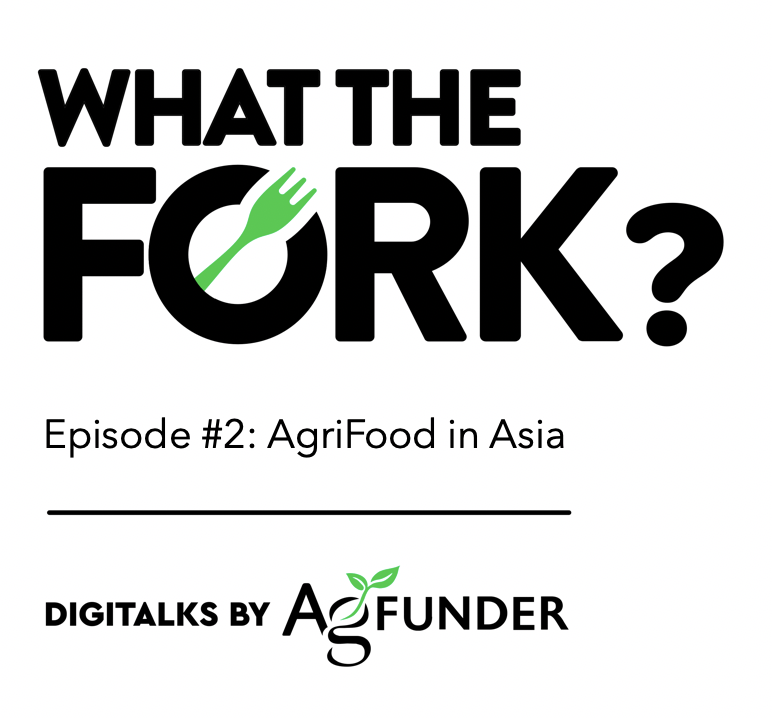Covid-19 started in Asia, and the region was the first to feel the social and economic impacts of the disease as it spread worldwide. It’s also where businesses, entrepreneurs, investors, and governments have spent the most time dealing with Covid-19 and its effects. Their insights and experience – and the strategies they’ve adopted to ride out the pandemic – could prove invaluable to agrifood players not just in Asia, but elsewhere in the world, too.
That’s why we focused the second episode of our new What The Fork? Digitalks by AgFunder series on Asia, and how agrifood businesses and investors here are tackling Covid-19. AgFunder’s hand-picked lineup of thought leaders also shared their thoughts on where the region’s investment landscape is headed as the pandemic eases.
Joining AgFunder founding partner Michael Dean were:
- Anuj Maheshwari, managing director, agribusiness, at Temasek – a Singaporean sovereign fund and top tech investor with close to $222 billion assets under management;
- Suresh Sundararjan, managing director and group head, global corporate services, at Olam – a Singapore-based agribusiness corporation which is a major player in the global food commodity trade;
- Matt Kovac, executive director at Food Industry Asia (FIA) – an advocacy group representing the interests of food manufacturers, producers, and retailers across the region.
Check out the video recording of the webinar below – or scroll down for key insights. The audio-only recording is also available via our Future Food podcast on your favorite podcasting app, or embedded at the bottom of the page.
In the meantime, here are a few of the key takeaways and talking points:
Mixed messages from the authorities are hitting supply chains:
-
- While food processing and manufacturing have generally been declared as ‘essential services’ across Asia – and are therefore permitted to continue operations amid lockdown – movement restrictions and ‘stay-at-home’ orders mean that food and ag companies have struggled to get enough workers to keep their factories running optimally. “While plants could run at full capacity, [there’s] a problem with labor,” Olam’s Sundararjan said. Kovac added that many Food Industry Asia’s members reported their factories operating at closer to 50% capacity, with knock-on effects for supply chains.
- Messaging from the authorities has not always translated into efficient practices at the ground level. As an example, Kovac told how a district-level authority in the Philippines had classed animal feed as a non-essential item, causing delays and disruptions to the delivery of a vital element in the district’s food production capability. This was despite the fact that the national government classed the overall food supply chain as essential.
- Nevertheless, the initial shock from Covid-19 and the ensuing lockdown measures is easing. While business is severely restricted in Asia, FIA stakeholders are increasingly adapting to the ‘new normal’ where they can. “Three to four weeks ago, it was awful,” Kovac said. “Things are beginning to stabilize.”
- While food processing and manufacturing have generally been declared as ‘essential services’ across Asia – and are therefore permitted to continue operations amid lockdown – movement restrictions and ‘stay-at-home’ orders mean that food and ag companies have struggled to get enough workers to keep their factories running optimally. “While plants could run at full capacity, [there’s] a problem with labor,” Olam’s Sundararjan said. Kovac added that many Food Industry Asia’s members reported their factories operating at closer to 50% capacity, with knock-on effects for supply chains.
Longstanding logistical problems are being magnified, while protectionism tempts leaders
-
- Southeast Asia, in particular, faces perennial logistical difficulties due to the archipelagic nature of much of the region. Even before Covid-19, island countries such as Indonesia and the Philippines struggled to keep food supplies to remote areas consistent. The disease is making that situation worse, Kovac said.
- ASEAN member states have also dabbled in protectionist measures in an effort to ensure their domestic food stocks, leading to shortages and supply issues in neighboring countries. Vietnam, for example, halted the export of rice periodically before gradually reopening supplies. “The problem in Vietnam now is stocks are dwindling [again],” Kovac said. “But so far the protectionism issues haven’t reared their head like 2012 and 2008. Unfortunately, in wheat-producing countries such as Kazakhstan, you’re [now] seeing them saying they won’t export […] The definition of food security is not protectionism”.
- In Singapore, the government’s existing ’30 by 30′ strategy of having 30% of food needs sourced within the city-state by 2030 has been brought into sharper focus, Maheshwari said. “The aspiration is no longer that we wait till 2030. [The government] has seen that tech can make even a tiny little state like ours produce more through vertical farms, recirculated aquaculture […] We have to plan for the worst case, and plan to produce for ourselves, because that’s the most resilient food strategy,” he said.
Ag marketplaces and health foods are in their element
-
- Asian consumer interest in health and nutrition is booming, as people think about how they can protect themselves against Covid-19 and future epidemics. Investors are seeing a positive impact on portfolio companies offering health foods and nutraceutical products – and these will become all the more important as food supply chains localize to avoid the negative impact of global crises like Covid-19, Maheshwari said. “We were very used to having diets [pre-Covid-19] with berries from Mexico, avocadoes from Australia, and so on. That may no longer be the case,” he said. “So I think this vertical of nutraceuticals will see a real boost. We’ve already seen it in supermarkets, where manufacturers are not able to keep up with the demand for multivitamins.”
- Another category experiencing positive demand is online ag marketplaces that connect farmers to service providers and customers. The model “never really took off because switching costs was too high,” according to Maheshwari. “But that has changed overnight with Covid.” Agribazaar, an Indian ag marketplace backed by Temasek, saw a 10x increase in its monthly sales in March, he added. AgFunder’s DeHaat has also seen positive momentum.
- The boom for ag marketplaces in India is partly due to intervention from the government, which – in the absence of traditional farmers’ markets – is using the platforms to buy produce and sell it on for milling, processing, and retail. “Any company in that digital platform space today should be really accelerating – even if they don’t have their app ready – because buyers and sellers need to be connected,” urgently, Maheshwari said.
Sustainability still matters – in fact, now more than ever
-
- With the more pressing issues now at hand, some fear that longer-term sustainability drives will fall by the wayside. But the problems presented by Covid-19 are closely linked to environmental and economic sustainability – so it would be foolish to drop the ball now, the panelists agreed. “The importance of this will only increase,” Sundararjan said. “People have gotten a wake-up call because of this crisis.” The public has seen air pollution in many parts of the world hitting its lowest levels in decades due to factory closures and moratoria on transport – while wildlife appears to be flourishing in the deserted streets. This could lead to heightened public expectations around sustainability in food and agriculture, Sundararjan said. “I think this will get more traction” rather than less, he added. “There’s no way we’re going to take the eye off the ball at Olam or for our customers.”
- Covid-19 presents a golden opportunity to “transition to greener, circular economies,” said Kovac. FIA has noted a surge in the use of single-use plastics due to the public’s Covid-driven worries about contact. “That’s a problem we don’t want to increase [at this time],” he said. “We’re asking for regulation on food contact materials across all markets to try to get that back into the food chain and recycle that. So in fact, [Covid-19] reinforces our approach.”
Want to learn about how to invest in the growing number of sustainable agri-foodtech opportunities in Asia? Email [email protected]





